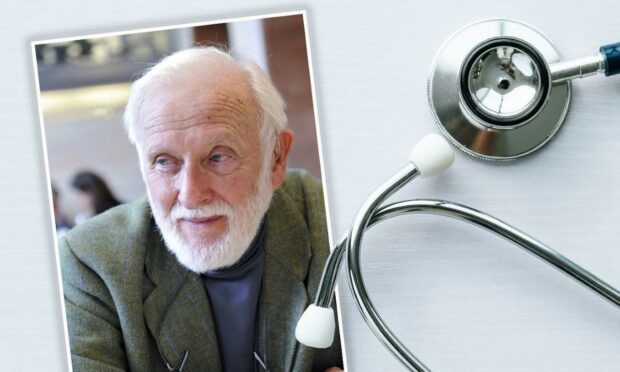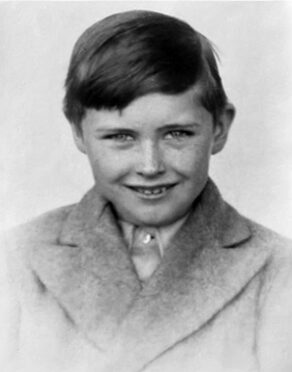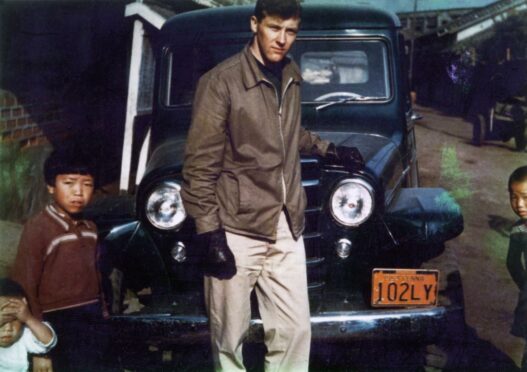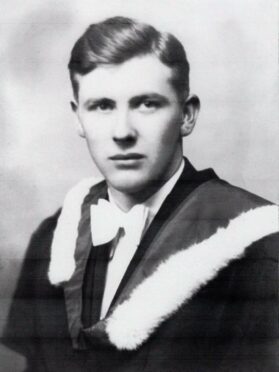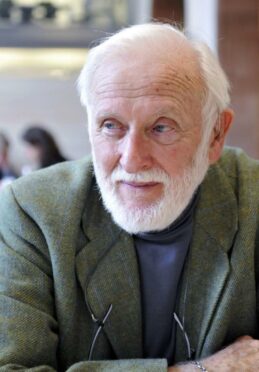Retired neuroradiologist, Dr Sandy MacDonald, has died aged 92.
His family look back on the life of the Queen’s Cross Church chorister who pioneered specialist radiology and life-saving mammogram services in the north-east.
Foundation of faith
Alexander Farquharson MacDonald – better known as Sandy – was born on July 15 1929 in Perth.
He was the youngest of three children to parents Alec and Mary McDonald.
Alec was a high street draper and Mary worked in the linen mills until her marriage.
Both of Sandy’s parents were committed Christians involved with Perth Methodist Church.
Carrying on their legacy, he remained a ‘Methodist at heart’ all of his life.
This outworked itself in strong, Christian Socialist values.
He was a member of the Labour Party for most of his life with the exception being the years immediately following the Iraq war.
The beautiful game
Sandy attended Perth Academy.
Known for it’s rugby, the school prohibited football – the game Sandy loved.
Taking after his father – a great footballer – Sandy and friends would head to North Inch after school to practice.
However, rumours of their ‘misdemeanours’ would often beat them back to school.
The result was that Sandy and his friends would be lined up and belted by the PE teacher each time they were found out.
“Far from a deterrent, this behaviour only encouraged them to carry on improving their skills in the ‘beautiful game’.”
It certainly paid off, because Sandy and school friend, Frank Begg later played for Edinburgh University.
And Sandy also formed part of the Spartans squad, in the East of Scotland League, while still in Edinburgh.
Medicine
Sandy’s two older siblings Charlie and Mary pursued careers in medicine and their younger brother followed suit.
Graduating with an MBChB in 1952 from Edinburgh University it wouldn’t be long before National Service would come calling.
However, Sandy was a conscientious objector and refused to be conscripted.
He was called before a tribunal, which initially rejected his stance, but on appeal he was allowed to spend his time in a Quaker Service Unit Hospital instead.
Stationed in South Korea for two years, he worked in lieu of National Service.
“It was a poverty-stricken country, devastated by the war which was just over. And the conditions were quite primitive and harsh.
“But he learned a great deal of medicine and about people living with great hardship, which stood him in good stead later in his career.”
Granite City bound
On returning to Scotland, Sandy studied radiology at Edinburgh Royal Infirmary.
It was there he met and married Joan Purves, a radiographer, in 1960.
After qualifying with DMRD (Diploma in Medical Radiodiagnosis) he specialised in neuroradiology.
Focusing on diagnosing abnormalities of the central and peripheral nervous system, spine, head and neck, he trained under renowned neuroradiologist Dr Tony Donaldson.
In 1964 Sandy took on a consultant radiology post in Aberdeen’s Royal Infirmary.
Pioneering work
“He found himself in an X-ray department that had little or no experience of the specialist skills and knowledge needed to carry out neuroradiology.
“So he set about building up this much-needed service for Aberdeen and the north-east. And was determined that it should equal those in Edinburgh and Glasgow.
“He made sure that Aberdeen acquired all the new scanning equipment as it was developing, and with sheer determination and hard work, he succeeded in his aim.”
He also supervised the starting up of the mammogram service at the ARI.
Influential
Part of Sandy’s role was to train junior radiologists in neuroradiology.
“He always had high standards and expected nothing less from others, always for the benefit of patients.
“Although junior doctors may have found him scary at times, he was held in the highest esteem by clinical colleagues in all specialisms.”
Many of his students went on to successful careers within this specialist field, at home and abroad.
No rest in retirement
Following his retirement in 1992, Sandy became a student again.
This time he undertook a three-year HND course in musical instrument technology.
While at college – aged 62 – he learned to play clarinet.
Subsequently he later enjoyed being part of Aberdeen’s Northfield Band conducted by Charles Foster.
“He spent the next 20 years doing the meticulous and skillful job of repairing all types of woodwind instruments, from piccolos to contra-bassoons.”
He also had a lifelong love and interest in choral music and sang as part of the Queen’s Cross Church choir until he was 90.
Dons fan
Along with his passion for work and his family, his love of football remained.
He was an Aberdeen season ticket holder who recalled fondly the glory years of Alex Ferguson in the 70s and 80s.
His two other passions were jazz and cricket.
Sandy had an encyclopedic knowledge of jazz throughout the years which he shared with his friend and retired Aberdeen ENT surgeon, Bill Newlands.
And he and Joan also enjoyed travelling to jazz festivals in the UK and abroad.
Cricket
Sandy was a life member of Aberdeenshire Cricket Club but also held a membership at Yorkshire Cricket Club.
In later years Sandy’s son Charlie became a member of Surrey Cricket Club in London.
“Sandy would delight in travelling to London to attend Test matches at the Oval with Charlie and friends, no doubt muttering his own critical commentary.”
Thinking of others
Known for his generosity Sandy donated to many national and international charities.
“He was always aware of those less fortunate than himself.
“He was witty, had a wonderful turn of phrase and could deflate pomposity at a single stroke.”
Sandy will be remembered as someone who was hugely proud of his family, sharing with them a love of football, cricket and music.
As a keen cyclist, he was still going trips with his friend, Tom Scotland, until recently.
Sandy’s death was unexpected but peaceful following only three days of illness.
Dr Alexander Farquharson MacDonald, MRCP, FFR FRCP is survived by his wife, Joan, his family, Jane, Charlie, Lorraine and Peter, and six grandchildren.
